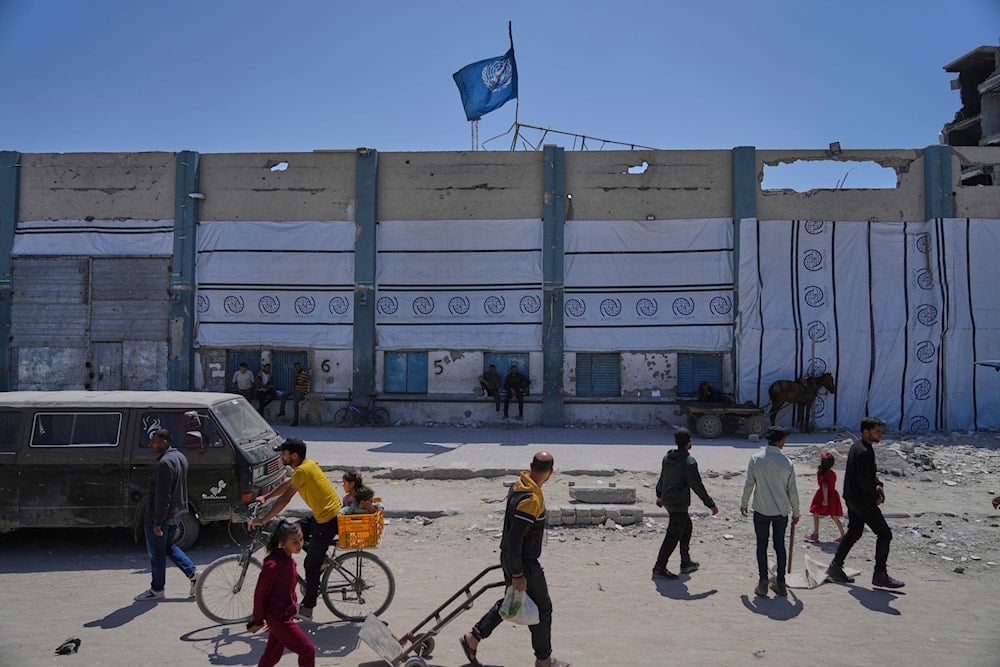ICJ wraps hearings on 'Israel’s' obligations to facilitate aid to Gaza
The International Court of Justice concludes hearings on "Israel's" obligations to ensure that humanitarian aid reaches Palestinians in Gaza and the occupied West Bank, as UNRWA remains banned.
-

Palestinians walk next to the closed humanitarian aid distribution center of UNRWA, the U.N. agency helping Palestinian refugees in Jabaliya, Gaza Strip, on April 29, 2025. (AP Photo/Jehad Alshrafi)
The International Court of Justice (ICJ) concluded a week of hearings on Friday to determine what legal obligations "Israel" holds in ensuring the delivery of urgently needed humanitarian aid to Palestinians in Gaza and the occupied West Bank, reported the Associated Press (AP) on Friday.
The case, brought before the court following a request by the United Nations General Assembly, addresses "Israel’s" ban on the United Nations Relief and Works Agency (UNRWA), the primary aid provider in Gaza.
According to AP, the hearings come as the humanitarian system in Gaza teeters on the brink of collapse, with "Israel" having blocked the entry of food, medicine, fuel, and other essential supplies since March 2.
A renewed military offensive launched on March 18 broke a brief ceasefire, and large parts of Gaza have since been seized under the pretext of pressuring Hamas to release the captives. Although "Israel" declined to participate in the hearings, it submitted a 38-page written statement for the court’s consideration.
'Israel' blocks lifesaving aid
The AP report stressed that the focus of the hearings was the legal requirement for states to enable the unhindered provision of humanitarian assistance, adding that the case follows "Israel’s" January ban on UNRWA operations in Gaza.
In turn, Prime Minister Benjamin Netanyahu and members of his far-right coalition claim the agency is infiltrated by Hamas, an accusation UNRWA has rejected.
Experts say the ban has crippled relief efforts in Gaza, where the population faces acute shortages and where international agencies have warned of an impending famine. "This advisory opinion is a very important opportunity to reinforce that states cannot pick and choose where the UN is allowed to operate," said Mike Becker, a human rights law expert at Trinity College Dublin.
While the ICJ’s advisory opinions are considered "nonbinding," they carry significant legal and diplomatic weight, arguing that the treaty governing protections for UN personnel stipulates that such disputes should be resolved through the ICJ and that the court’s opinion "shall be accepted as decisive by the parties."
The AP report explains that legal experts argue the proceedings could set a precedent for future interpretations of United Nations immunity and operational authority worldwide, adding, "The court has the opportunity to clarify and address questions about the legal immunities of the United Nations."
"This is not just about Gaza, it’s about the ability of the UN to function wherever it operates," Becker said.
Positions of the Palestinians and 'Israel' at the ICJ
During the hearings, the Palestinian delegation accused "Israel" of violating international law in its occupation and blockade of Palestinian territories, and Palestinian UN envoy Riyad Mansour described the case as part of a broader strategy to assert Palestinian rights at international institutions.
“Our journey with the international institutions… is building block upon block toward the inalienable rights of the Palestinian people, including our right to self-determination, statehood, and the right of the refugees,” Mansour told reporters.
"Israel", in contrast, has denounced the proceedings as politically motivated. Israeli Foreign Minister Gideon Saar accused UNRWA, the UN, and the Secretary-General of “weaponizing” international law against what he called “the most attacked country in the world.”
Legal observers believe the ICJ’s forthcoming advisory opinion could reaffirm earlier positions. Just nine months ago, the court issued a sweeping condemnation of "Israel’s" presence in the occupied Palestinian territories, declaring it illegal under international law and calling for its end.
"The starting premise now is that 'Israel' is illegally occupying all of Palestine," said Juliette McIntyre, a law scholar at the University of South Australia. "This week’s arguments are a continuation of that legal foundation."
McIntyre also noted the wider impact of the court’s guidance: "Every time a norm is breached, the norm gets weaker. The advisory opinion in this case could push the norm back."
The ICJ is expected to issue its advisory opinion in the coming months.

 4 Min Read
4 Min Read









